28 Best Academic Search Engines That make your research easier
This post may contain affiliate links that allow us to earn a commission at no expense to you. Learn more

If you’re a researcher or scholar, you know that conducting effective online research is a critical part of your job. And if you’re like most people, you’re always on the lookout for new and better ways to do it.
I’m sure you are familiar with some research databases. But, top researchers keep an open mind and are always looking for inspiration in unexpected places.
This article aims to give you an edge over researchers that rely mainly on Google for their entire research process.
Our list of 28 academic search engines will start with the more familiar to less.
Table of Contents

#1. Google Scholar

Google Scholar is an academic search engine that indexes the full text or metadata of scholarly literature across an array of publishing formats and disciplines.
Great for academic research, you can use Google Scholar to find articles from academic journals, conference proceedings, theses, and dissertations. The results returned by Google Scholar are typically more relevant and reliable than those from regular search engines like Google.
Tip: You can restrict your results to peer-reviewed articles only by clicking on the “Scholarly”
- Scholarly results are typically more relevant and reliable than those from regular search engines like Google.
- You can restrict your results to peer-reviewed articles only by clicking on the “Scholarly” tab.
- Google Scholar database Coverage is extensive, with approx. 200 million articles indexed.
- Abstracts are available for most articles.
- Related articles are shown, as well as the number of times an article has been cited.
- Links to full text are available for many articles.
- Abstracts are only a snippet of the full article, so you might need to do additional searching to get the full information you need.
- Not all articles are available in full text.
Google Scholar is completely free.
#2. ERIC (Education Resources Information Center)
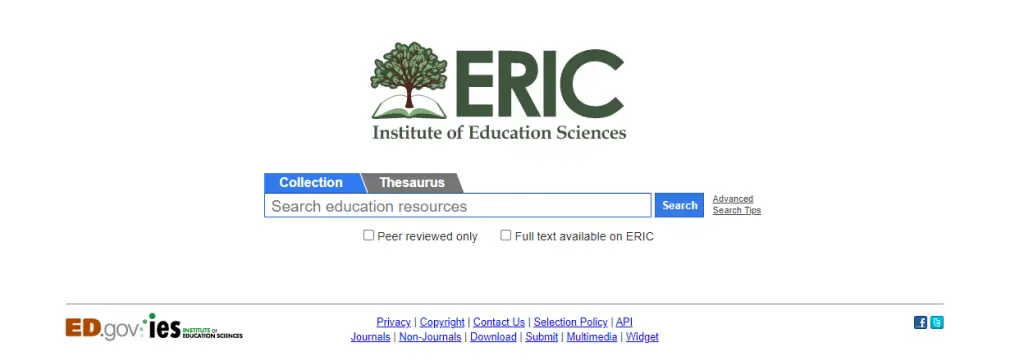
ERIC (short for educational resources information center) is a great academic search engine that focuses on education-related literature. It is sponsored by the U.S. Department of Education and produced by the Institute of Education Sciences.
ERIC indexes over a million articles, reports, conference papers, and other resources on all aspects of education from early childhood to higher education. So, search results are more relevant to Education on ERIC.
- Extensive coverage: ERIC indexes over a million articles, reports, and other resources on all aspects of education from early childhood to higher education.
- You can limit your results to peer-reviewed journals by clicking on the “Peer-Reviewed” tab.
- Great search engine for educators, as abstracts are available for most articles.
ERIC is a free online database of education-related literature.
You might also like:
- SCI Journal: Science Journal Impact Factor
- 15 Best Websites to Download Research Papers for Free
- 11 Best Academic Writing Tools For Researchers 2024
- 10 Best Reference Management Software for Research 2024
- Academic Tools
#3. Wolfram Alpha

Wolfram Alpha is a “computational knowledge engine” that can answer factual questions posed in natural language. It can be a useful search tool.
Type in a question like “What is the square root of 64?” or “What is the boiling point of water?” and Wolfram Alpha will give you an answer.
Wolfram Alpha can also be used to find academic articles. Just type in your keywords and Wolfram Alpha will generate a list of academic articles that match your query.
Tip: You can restrict your results to peer-reviewed journals by clicking on the “Scholarly” tab.
- Can answer factual questions posed in natural language.
- Can be used to find academic articles.
- Results are ranked by relevance.
- Results can be overwhelming, so it’s important to narrow down your search criteria as much as possible.
- The experience feels a bit more structured but it could also be a bit restrictive
Wolfram Alpha offers a few pricing options, including a “Pro” subscription that gives you access to additional features, such as the ability to create custom reports. You can also purchase individual articles or download them for offline use.
Pro costs $5.49 and Pro Premium costs $9.99
#4. iSEEK Education
- 15 Best Websites To Download Research Papers For Free
- 30+ Essential Software For Researchers
- 15 Best Academic Research Trend Prediction Platforms
- 15 Best Academic Networking And Collaboration Platforms
iSEEK is a search engine targeting students, teachers, administrators, and caregiver. It’s designed to be safe with editor-reviewed content.
iSEEK Education also includes a “Cited by” feature which shows you how often an article has been cited by other researchers.
- Editor-reviewed content.
- “Cited by” feature shows how often an article has been cited by other researchers.
- Limited to academic content.
- Doesn’t have the breadth of coverage that some of the other academic search engines have.
iSEEK Education is free to use.
#5. BASE (Bielefeld Academic Search Engine)
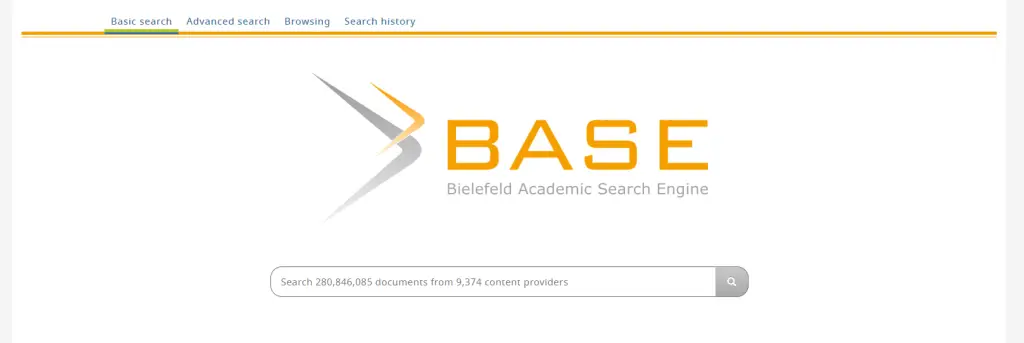
BASE is hosted at Bielefeld University in Germany and that’s where it name stems from (Bielefeld Academic Search Engine).
Known as “one of the most comprehensive academic web search engines,” it contains over 100 million documents from 4,000 different sources.
Users can narrow their search using the advanced search option, so regardless of whether you need a book, a review, a lecture, a video or a thesis, BASE has what you need.
BASE indexes academic articles from a variety of disciplines, including the arts, humanities, social sciences, and natural sciences.
- One of the world’s most voluminous search engines,
- Indexes academic articles from a variety of disciplines, especially for academic web resources
- Includes an “Advanced Search” feature that lets you restrict your results to peer-reviewed journals.
- Doesn’t include abstracts for most articles.
- Doesn’t have related articles, references, cited by
BASE is free to use.
- 10 Best Reference Management Software for Research 2023
- 15 Best Academic Networking and Collaboration Platforms
- 30+ Essential Software for Researchers
- 15 Best Academic Blogging and Content Management
- 11 Best Academic Writing Tools For Researchers
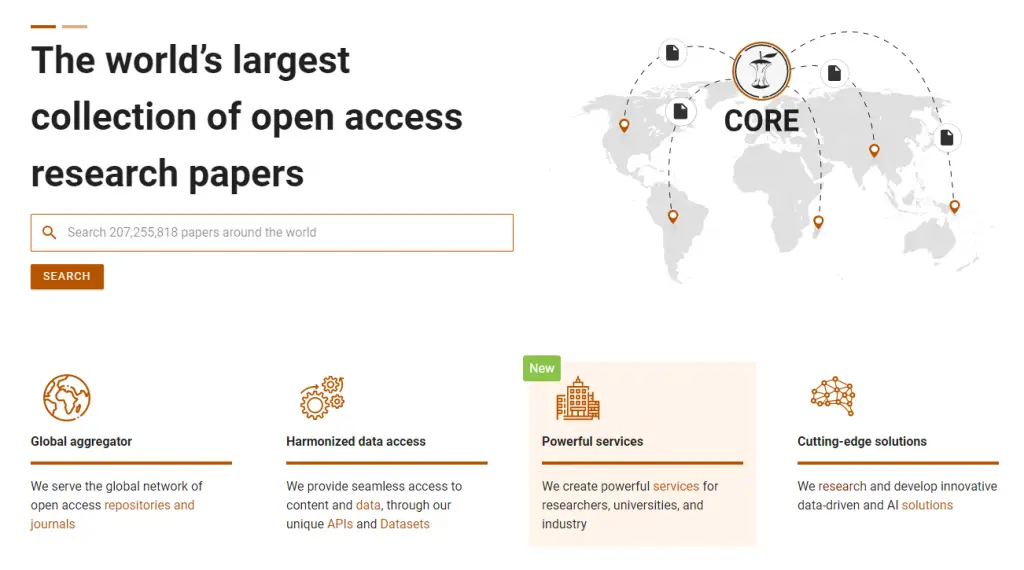
CORE is an academic search engine that focuses on open access research papers. A link to the full text PDF or complete text web page is supplied for each search result. It’s academic search engine dedicated to open access research papers.
- Focused on open access research papers.
- Links to full text PDF or complete text web page are supplied for each search result.
- Export formats include BibTeX, Endnote, RefWorks, Zotero.
- Coverage is limited to open access research papers.
- No abstracts are available for most articles.
- No related articles, references, or cited by features.
CORE is free to use.
- Best Plagiarism Checkers for Research Papers in 2024
#7. Science.gov

Science.gov is a search engine developed and managed by the United States government. It includes results from a variety of scientific databases, including NASA, EPA, USGS, and NIST.
US students are more likely to have early exposure to this tool for scholarly research.
- Coverage from a variety of scientific databases (200 million articles and reports).
- Links to full text are available for some articles.
Science.gov is free to use.
- 15 Best Academic Journal Discovery Platforms
- Sci Hub Review
#8. Semantic Scholar

Semantic Scholar is a recent entrant to the field. Its goal is to provide more relevant and effective search results via artificial intelligence-powered methods that detect hidden relationships and connections between research topics.
- Powered by artificial intelligence, which enhances search results.
- Covers a large number of academic articles (approx. 40 million).
- Related articles, references, and cited by features are all included.
- Links to full text are available for most articles.
Semantic Scholar is free to use.
- 11 Best Academic Writing Tools For Researchers
- 10 Best Reference Management Software for Research
- 15 Best Academic Journal Discovery Platforms
#9. RefSeek

RefSeek searches more than five billion documents, including web pages, books, encyclopedias, journals, and newspapers.
This is one of the free search engines that feels like Yahoo with a massive directory. It could be good when you are just looking for research ideas from unexpected angles. It could lead you to some other database that you might not know such as the CIA The World Factbook, which is a great reference tool.
- Searches more than five billion documents.
- The Documents tab is very focused on research papers and easy to use.
- Results can be filtered by date, type of document, and language.
- Good source for free academic articles, open access journals, and technical reports.
- The navigation and user experience is very dated even to millenials…
- It requires more than 3 clicks to dig up interesting references (which is how it could lead to you something beyond the 1st page of Google)
- The top part of the results are ALL ads (well… it’s free to use)
RefSeek is free to use.
#10. ResearchGate
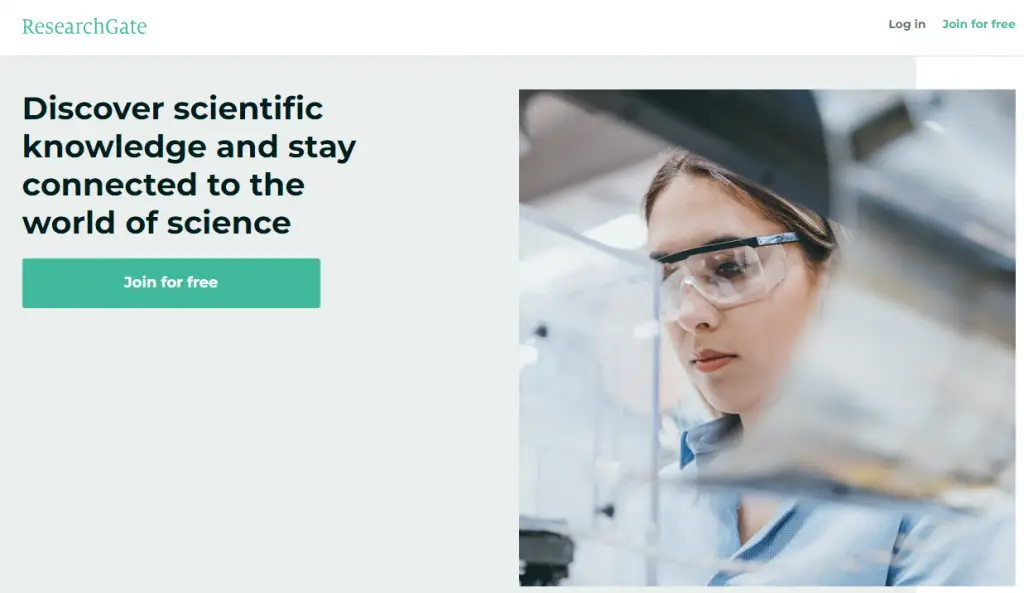
A mixture of social networking site + forum + content databases where researchers can build their profile, share research papers, and interact with one another.
Although it is not an academic search engine that goes outside of its site, ResearchGate ‘s library of works offers an excellent choice for any curious scholar.
There are more than 100 million publications available on the site from over 11 million researchers. It is possible to search by publication, data, and author, as well as to ask the researchers questions.
- A great place to find research papers and researchers.
- Can follow other researchers and get updates when they share new papers or make changes to their profile.
- The network effect can be helpful in finding people who have expertise in a particular topic.
- Interface is not as user friendly
- Can be overwhelming when trying to find relevant papers.
- Some papers are behind a paywall.
ResearchGate is free to use.
- 15 Best Academic Research Trend Prediction Platforms
- 25 Best Tools for Tracking Research Impact and Citations
#11. DataONE Search (formerly CiteULike)
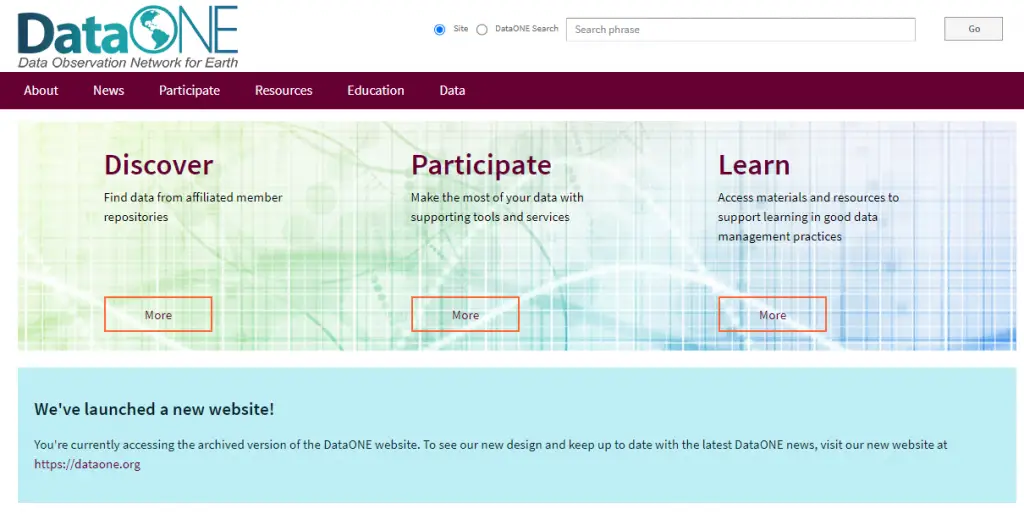
A social networking site for academics who want to share and discover academic articles and papers.
- A great place to find academic papers that have been shared by other academics.
- Some papers are behind a paywall
CiteULike is free to use.
#12. DataElixir

DataElixir is deigned to help you find, understand and use data. It includes a curated list of the best open datasets, tools and resources for data science.
- Dedicated resource for finding open data sets, tools, and resources for data science.
- The website is easy to navigate.
- The content is updated regularly
- The resources are grouped by category.
- Not all of the resources are applicable to academic research.
- Some of the content is outdated.
DataElixir is free to use.
#13. LazyScholar – browser extension
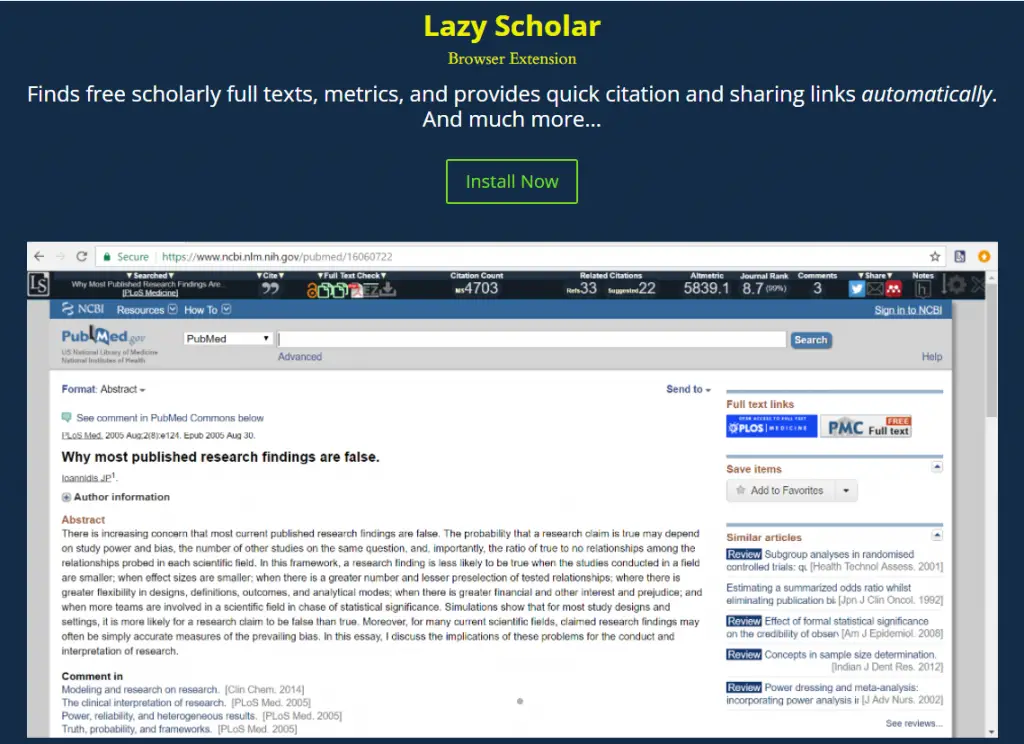
LazyScholar is a free browser plugin that helps you discover free academic full texts, metrics, and instant citation and sharing links. Lazy Scholar is created Colby Vorland, a postdoctoral fellow at Indiana University.
- It can integrate with your library to find full texts even when you’re off-campus.
- Saves your history and provides an interface to find it.
- A pre-formed citation is availlable in over 900 citation styles.
- Can recommend you topics and scans new PubMed listings to suggest new papers
- Results can be a bit hit or miss
LazyScholar is free to use.
#14. CiteseerX – digital library from PenState

CiteseerX is a digital library stores and indexes research articles in Computer Science and related fields. The site has a robust search engine that allows you to filter results by date, author.
- Searches a large number of academic papers.
- Results can be filtered by date, author, and topic.
- The website is easy to use.
- You can create an account and save your searches for future reference.
CiteseerX is free to use.
- Surfer Review: Is It Worth It?
- 25 Best Tools For Tracking Research Impact And Citations
#15. The Lens – patents search
The Lens or the Patent Lens is an online patent and scholarly literature search facility, provided by Cambia, an Australia-based non-profit organization.

- Searches for a large number of academic papers.
The price range can be free for non-profit use to $5,000 for commercial enterprise.
#16. Fatcat – wiki for bibliographic catalog
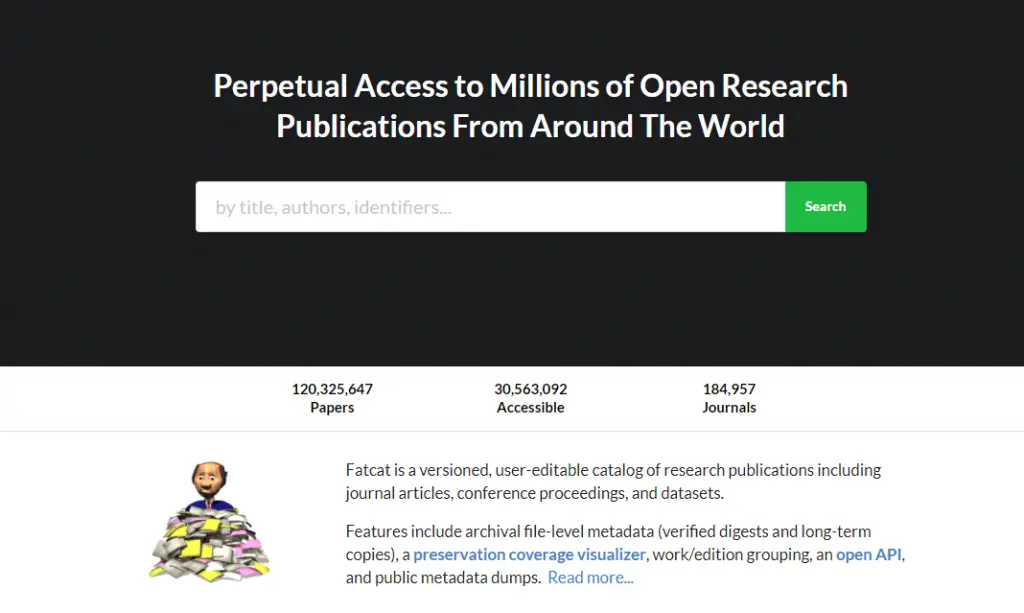
Fatcat is an open bibliographic catalog of written works. The scope of works is somewhat flexible, with a focus on published research outputs like journal articles, pre-prints, and conference proceedings. Records are collaboratively editable, versioned, available in bulk form, and include URL-agnostic file-level metadata.
- Open source and collaborative
- You can be part of the community that is very focused on its mission
- The archival file-level metadata (verified digests and long-term copies) is a great feature.
- Could prove to be another rabbit hole
- People either love or hate the text-only interface
#17. Lexis Web – Legal database
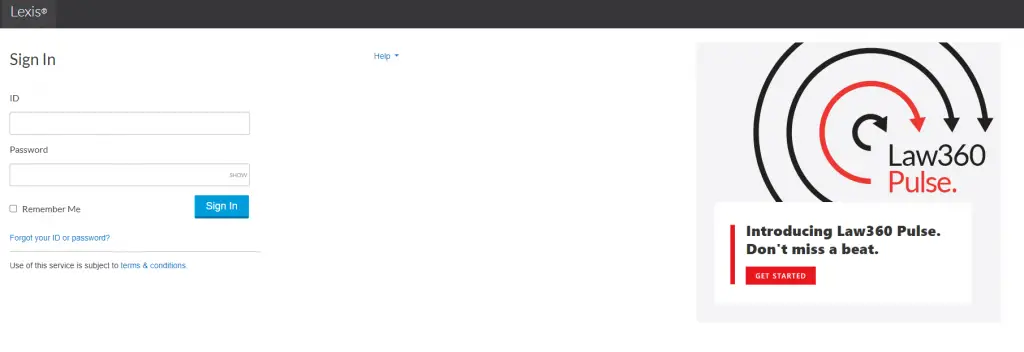
Are you researching legal topics? You can turn to Lexis Web for any law-related questions you may have. The results are drawn from legal sites and can be filtered based on criteria such as news, blogs, government, and commercial. Additionally, users can filter results by jurisdiction, practice area, source and file format.
- Results are drawn from legal sites.
- Filters are available based on criteria such as news, blogs, government, and commercial.
- Users can filter results by jurisdiction, practice area, source and file format.
- Not all law-related questions will be answered by this search engine.
- Coverage is limited to legal sites only.
Lexis Web is free for up to three searches per day. After that, a subscription is required.
#18. Infotopia – part of the VLRC family
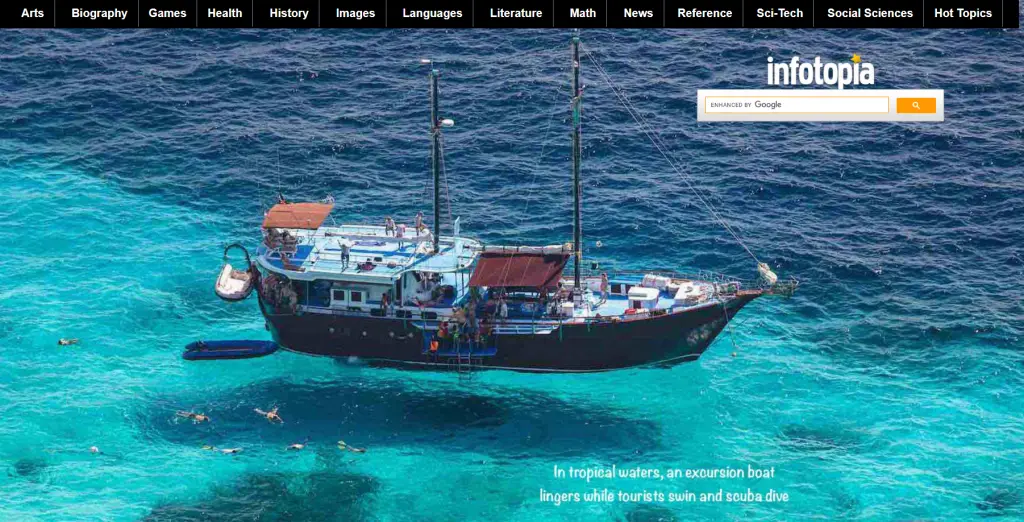
Infotopia touts itself as an “alternative to Google safe search.” Scholarly book results are curated by librarians, teachers, and other educational workers. Users can select from a range of topics such as art, health, and science and technology, and then see a list of resources pertaining to the topic.
Consequently, if you aren’t able to find what you are looking for within Infotopia’s pages, you will probably find it on one of its many suggested websites.
#19. Virtual Learning Resources Center
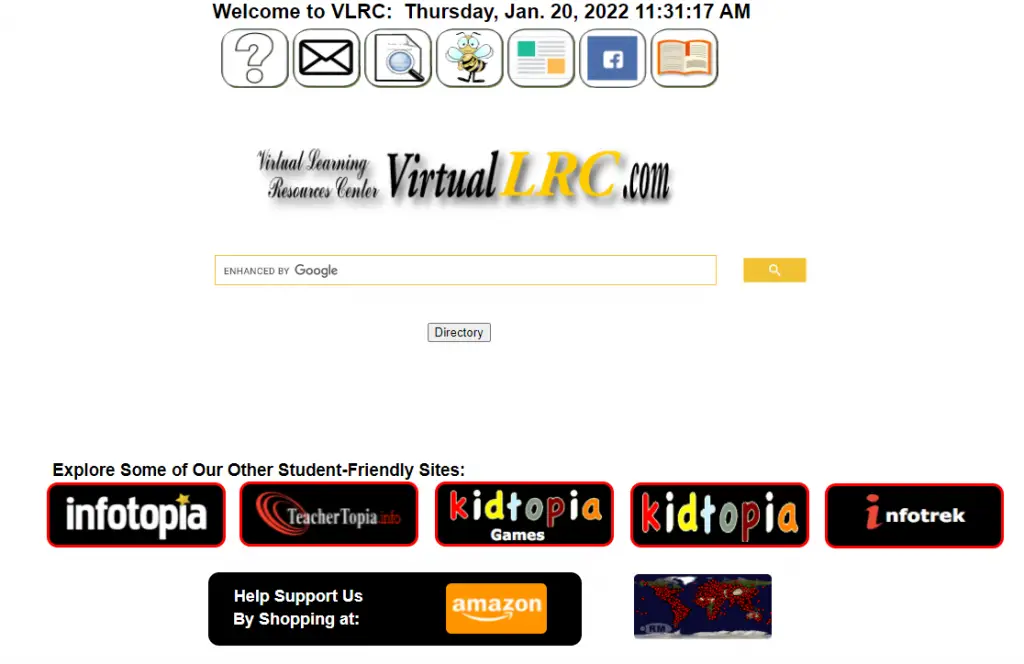
Virtual Learning Resources Center (VLRC) is an academic search engine that features thousands of academic sites chosen by educators and librarians worldwide. Using an index generated from a research portal, university, and library internet subject guides, students and instructors can find current, authoritative information for school.
- Thousands of academic information websites indexed by it. You will also be able to get more refined results with custom Google search, which will speed up your research.
- Many people consider VLRC as one of the best free search engines to start looking for research material.
- TeachThought rated the Virtual LRC #3 in it’s list of 100 Search Engines For Academic Research
- More relevant to education
- More relevant to students

Powered by Google Custom Search Engine (CSE), Jurn is a free online search engine for accessing and downloading free full-text scholarly papers. It was created by David Haden in a public open beta version in February 2009, initially for locating open access electronic journal articles in the arts and humanities.
After the indexing process was completed, a website containing additional public directories of web links to indexed publications was introduced in mid-2009. The Jurn search service and directory has been regularly modified and cleaned since then.
- A great resource for finding academic papers that are behind paywalls.
- The content is updated regularly.uren
Jurn is free to use.
#21. WorldWideScience
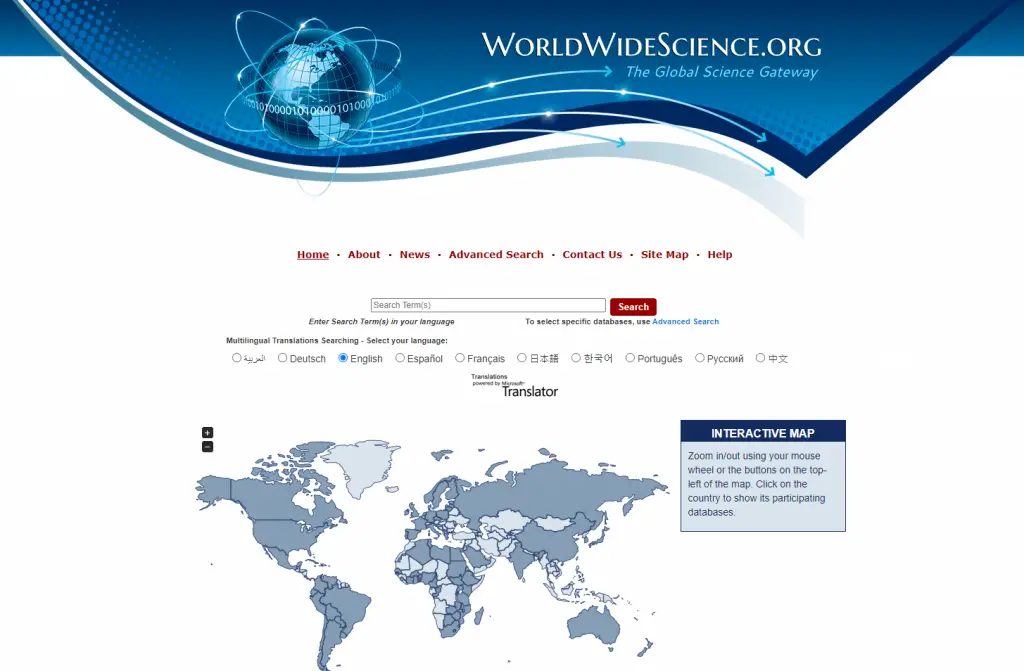
The Office of Scientific and Technical Information—a branch of the Office of Science within the U.S. Department of Energy—hosts the portal WorldWideScience , which has dubbed itself “The Global Science Gateway.”
Over 70 countries’ databases are used on the website. When a user enters a query, it contacts databases from all across the world and shows results in both English and translated journals and academic resources.
- Results can be filtered by language and type of resource
- Interface is easy to use
- Contains both academic journal articles and translated academic resources
- The website can be difficult to navigate.
WorldWideScience is free to use.
#22. Google Books
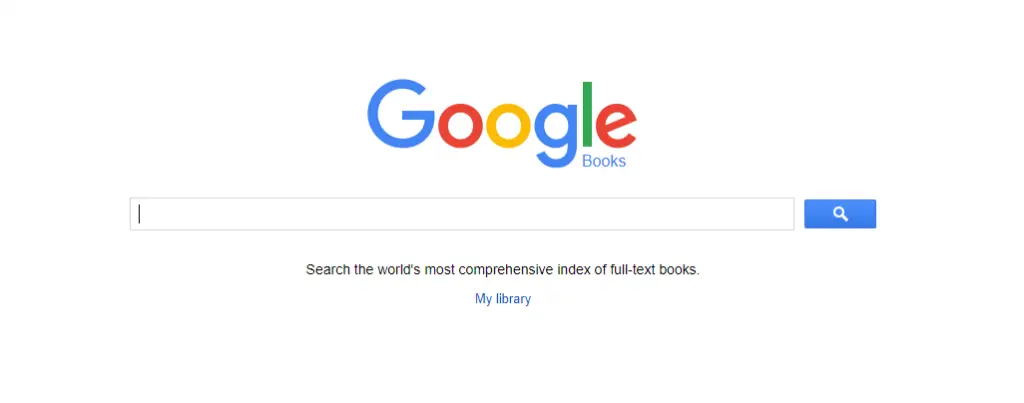
A user can browse thousands of books on Google Books, from popular titles to old titles, to find pages that include their search terms. You can look through pages, read online reviews, and find out where to buy a hard copy once you find the book you are interested in.
#23. DOAJ (Directory of Open Access Journals)
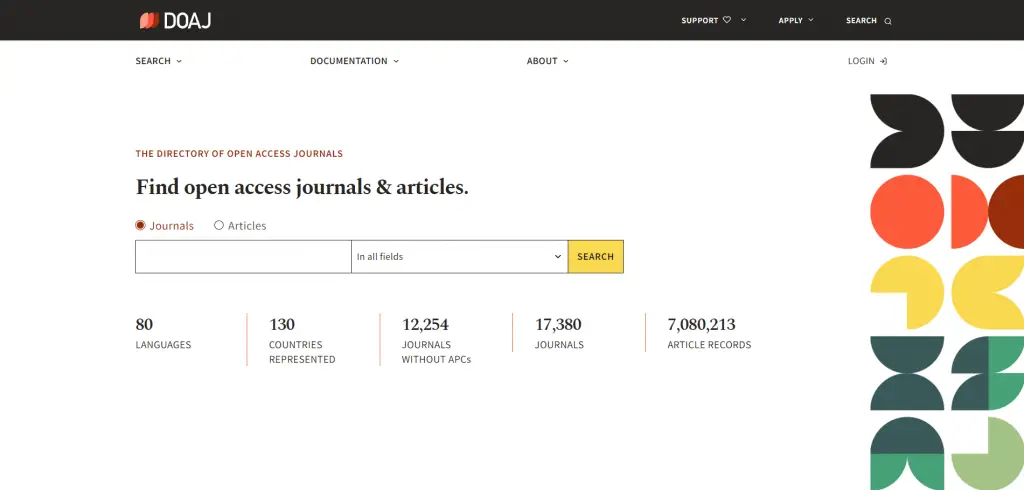
DOAJ is a free search engine for scientific and scholarly materials. It is a searchable database with over 8,000 peer-reviewed research papers organized by subject. It’s one of the most comprehensive libraries of scientific and scholarly resources, with over 8,000 journals available on a variety of themes.
#24. Baidu Scholar

Baidu Xueshu (Academic) is the Chinese version for Google Scholar. IDU Scholar indexes academic papers from a variety of disciplines in both Chinese and English.
- Articles are available in full text PDF.
- Covers a variety of academic disciplines.
- No abstracts are available for most articles, but summaries are provided for some.
- A great portal that takes you to different specialized research platform
- You need to be able to read Chinese to use the site
- Since 2021 there is a rise of focus on China and the Chinese Communist Party
Baidu Scholar is free to use.
#25. PubMed Central
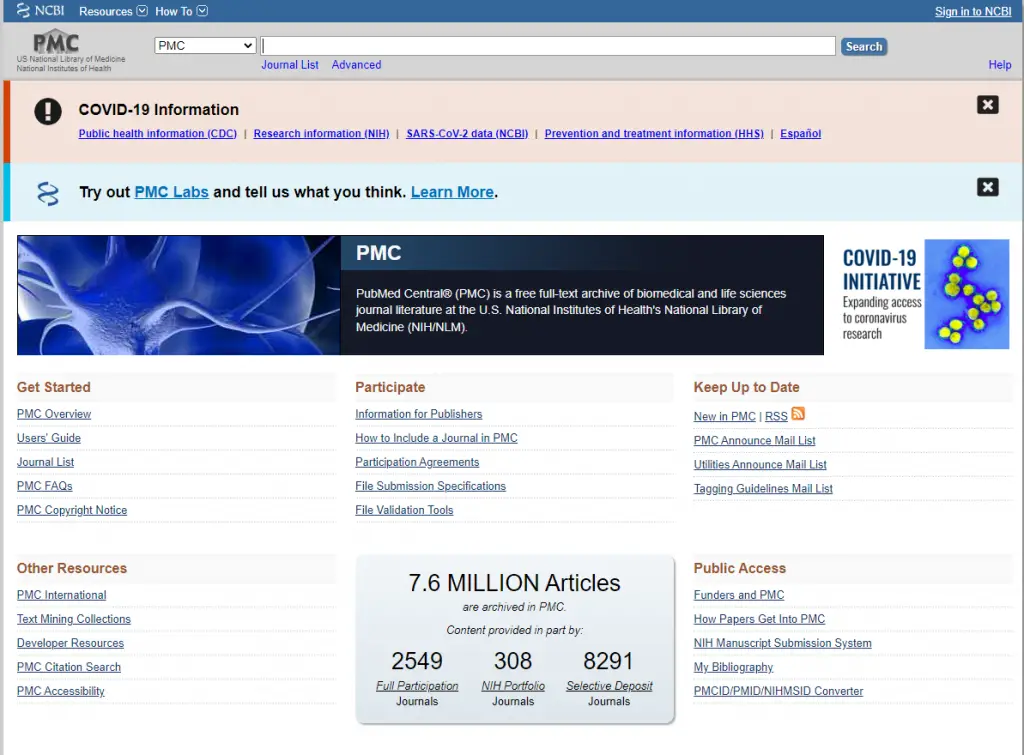
PubMed is a free search engine that provides references and abstracts for medical, life sciences, and biomedical topics.
If you’re studying anything related to healthcare or science, this site is perfect. PublicMed Central is operated by the National Center for Biotechnology Information, a division of the U.S. National Library of Medicine. It contains more than 3 million full-text journal articles.
It’s similar to PubMed Health, which focuses on health-related research and includes abstracts and citations to over 26 million articles.
#26. MEDLINE®
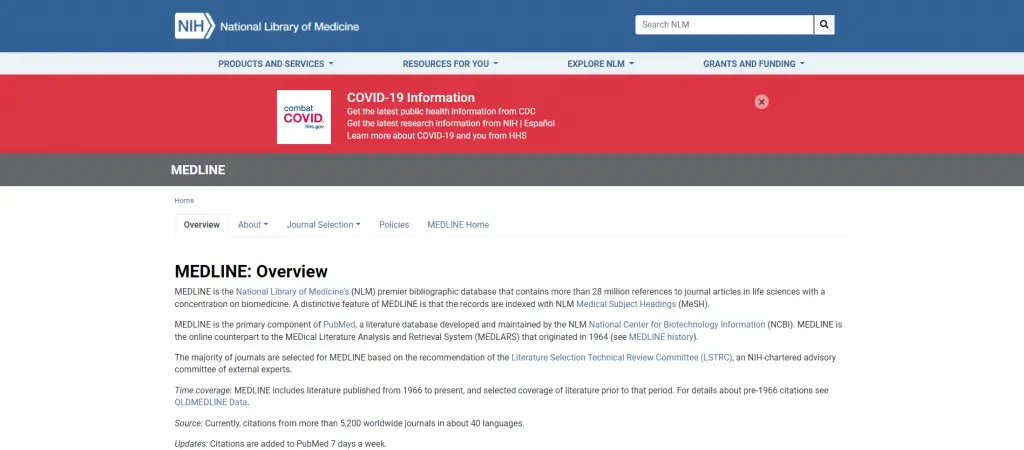
MEDLINE® is a paid subscription database for life sciences and biomedicine that includes more than 28 million citations to journal articles. For finding reliable, carefully chosen health information, Medline Plus provides a powerful search tool and even a dictionary.
- A great database for life sciences and biomedicine.
- Contains more than 28 million references to journal articles.
- References can be filtered by date, type of document, and language.
- The database is expensive to access.
- Some people find it difficult to navigate and find what they are looking for.
MEDLINE is not free to use ( pricing information ).
Defunct Academic Search Engines
#27. microsoft academic .
Microsoft Academic
Microsoft Academic Search seemed to be a failure from the beginning. It ended in 2012, then re-launched in 2016 as Microsoft Academic. It provides the researcher with the opportunity to search academic publications,
Microsoft Academic used to be the second-largest academic search engine after Google Scholar. Microsoft Academic provides a wealth of data for free, but Microsoft has announced that it will shut Microsoft Academic down in by 2022.
#28. Scizzle
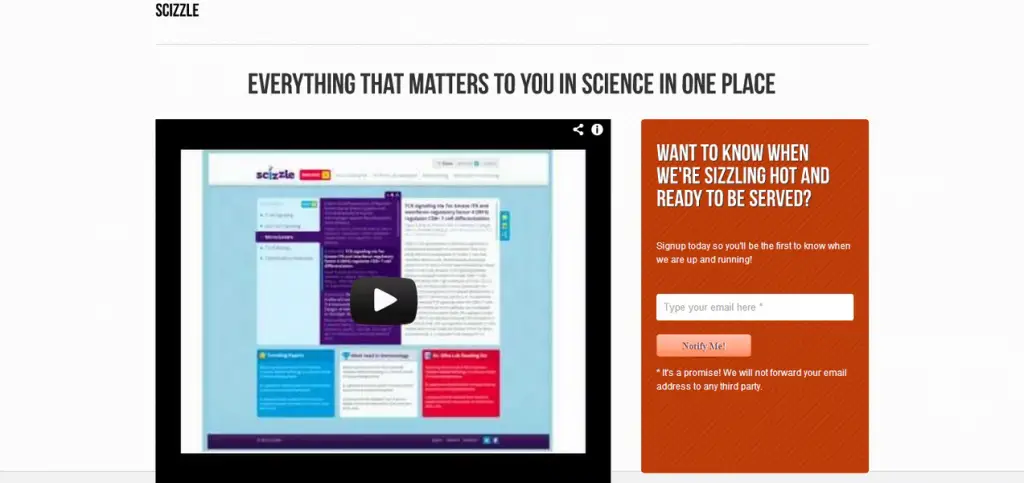
Designed to help researchers stay on top of the literature by setting up email alerts, based on key terms, for newspapers.
Unfortunately, academic search engines come and go. These are two that are no longer available.
Final Thoughts
There are many academic search engines that can help researchers and scholars find the information they need. This list provides a variety of options, starting with more familiar engines and moving on to less well-known ones.
Keeping an open mind and exploring different sources is essential for conducting effective online research. With so much information at our fingertips, it’s important to make sure we’re using the best tools available to us.
Tell us in the comment below which academic search engine have you not heard of? Which database do you think we should add? What database do your professional societies use? What are the most useful academic websites for research in your opinion?
There is more.
Check out our other articles on the Best Academic Tools Series for Research below.
- Learn how to get more done with these Academic Writing Tools
- Learn how to proofread your work with these Proofreading Tools
- Learn how to broaden your research landscape with these Academic Search Engines
- Learn how to manage multiple research projects with these Project Management Tools
- Learn how to run effective survey research with these Survey Tools for Research
- Learn how get more insights from important conversations and interviews with Transcription Tools
- Learn how to manage the ever-growing list of references with these Reference Management Software
- Learn how to double your productivity with literature reviews with these AI-Based Summary Generators
- Learn how to build and develop your audience with these Academic Social Network Sites
- Learn how to make sure your content is original and trustworthy with these Plagiarism Checkers
- Learn how to talk about your work effectively with these Science Communication Tools
10 thoughts on “28 Best Academic Search Engines That make your research easier”
Thank you so much Joannah..I have found this information useful to me as librarian in an academic library
You are welcome! We are happy to hear that!
Thank You Team, for providing a comprehensive list of academic search engines that can help make research easier for students and scholars. The variety of search engines included offers a range of options for finding scholarly articles, journals, and other academic resources. The article also provides a brief summary of each search engine’s features, which helps in determining which one is the best fit for a specific research topic. Overall, this article is a valuable resource for anyone looking for a quick and easy way to access a wealth of academic information.
Thank you for taking the time to share your feedback with us. We are delighted to hear that you found our list of academic search engines helpful in making research easier for students and scholars. We understand the importance of having a variety of options when it comes to finding scholarly articles, journals, and other academic resources, and we strive to provide a comprehensive list of resources to meet those needs.
We are glad that you found the brief summary of each search engine’s features helpful in determining which one is the best fit for a specific research topic. Our goal is to make it easy for our readers to access valuable academic information and we’re glad that we were able to achieve that for you.
We appreciate your support and thank you for your kind words. We will continue to provide valuable resources for students and researchers in the future. Please let us know if you have any further questions or suggestions.
No more questions Thank You
I cannot thank you enough!!! thanks alot 🙂
Typography animation is a technique that combines text and motion to create visually engaging and dynamic animations. It involves animating individual letters, words, or phrases in various ways to convey a message, evoke emotions, or enhance the visual impact of a design or video. – Typography Animation Techniques Tools and Online Software {43}
Hi Joannah! Here’s another one you may want to add! Expontum ( https://www.expontum.com/ ) – Helps researchers quickly find knowledge gaps and identify what research projects have been completed before. Thanks!
Expontum – Helps researchers quickly find knowledge gaps and identify what research projects have been completed before. Expontum is free, open access, and available to all globally with no paid versions of the site. Automated processes scan research article information 24/7 so this website is constantly updating. By looking at over 35 million research publications (240 million by the end of 2023), the site has 146 million tagged research subjects and 122 million tagged research attributes. Learn more about methodology and sources on the Expontum About Page ( https://www.expontum.com/about.php )
Hey Ryan, I clicked and checked your site and thought it was very relevant to our reader. Thank you for sharing. And, we will be reviewing your site soon.
Sounds good! Thanks, Joannah!
Leave a Comment Cancel reply
Save my name, email, and website in this browser for the next time I comment.
We maintain and update science journals and scientific metrics. Scientific metrics data are aggregated from publicly available sources. Please note that we do NOT publish research papers on this platform. We do NOT accept any manuscript.
2012-2024 © scijournal.org
Academia.edu no longer supports Internet Explorer.
To browse Academia.edu and the wider internet faster and more securely, please take a few seconds to upgrade your browser .
- We're Hiring!
- Help Center
Download 55 million PDFs for free
Explore our top research interests.

Engineering

Anthropology

- Earth Sciences

- Computer Science

- Mathematics

- Health Sciences

Join 279 million academics and researchers
Track your impact.
Share your work with other academics, grow your audience and track your impact on your field with our robust analytics
Discover new research
Get access to millions of research papers and stay informed with the important topics around the world
Publish your work
Publish your research with fast and rigorous service through Academia.edu Journals. Get instant worldwide dissemination of your work
Unlock the most powerful tools with Academia Premium

Work faster and smarter with advanced research discovery tools
Search the full text and citations of our millions of papers. Download groups of related papers to jumpstart your research. Save time with search alerts.
- Advanced Search
- PDF Packages of 37 papers
- Search Alerts

Share your work, track your impact, and grow your audience
Get notified when other academics mention you or cite your papers. Track your impact with in-depth analytics and network with members of your field.
- Mentions and Citations Tracking
- Advanced Analytics
- Publishing Tools
Real stories from real people

Used by academics at over 15,000 universities

Get started and find the best quality research
- Academia.edu Journals
- We're Hiring!
- Help Center
- Find new research papers in:
- Cognitive Science
- Academia ©2024
10 Best Online Academic Research Tools and Resources
Every college student conducts research at some point. And professors have strong views on what counts as a credible academic resource. Choosing the wrong sources can hurt your grade.
So how can you conduct research efficiently while avoiding sleepless nights in the campus library? Online academic research tools make it easier to find reliable sources quickly.
Rather than pulling random facts from the internet — and running into problems with citations — college students need to know how to find credible sources and how to use online academic tools. Keep reading to learn how you can find the best credible sources for your college research needs.
Popular Online Programs
Learn about start dates, transferring credits, availability of financial aid, and more by contacting the universities below.
The 10 Best Academic Research Sources
What resources will point you toward reliable sources for your academic research? Rather than scrolling through pages of search results, turn to these academic resources when you need to find sources.
1. Google Scholar
Looking for an academic article, thesis , or abstract? Google Scholar should be your first stop. Google Scholar helps you find related works, locate full documents at your school library , and access scholarly research.
While Google created Google Scholar, it’s very different from a general online search. Google Scholar brings together academic articles and ranks them based on the authors, publication location, and citation record. That means the top results generally represent the most reliable scholarship on your topic.
For journal articles, books, images, and even primary sources, JSTOR ranks among the best online resources for academic research. JSTOR’s collection spans 75 disciplines, with strengths in the humanities and social sciences . The academic research database includes complete runs of over 2,800 journals.
And if you’re looking for images, turn to Artstor , which offers over 2.5 million images related to the arts, sciences, and literature. However, JSTOR is not an open-access database. That means you’ll need to log in through your university library, which typically includes off-campus access .
3. Library of Congress
As the largest library in the world, the Library of Congress is an amazing online resource for academic research. Students can search its collections to access digital resources, videos, audio recordings, photographs, and maps.
The library’s materials also include notated music, web archives, legislation, and 3D objects. You’ll find materials for almost any topic in its extensive collections. You can search historic American newspapers from 1777-1963 with the Chronicling America tool or look up pirate trials in another digital collection.
4. PubMed Central
The National Library of Medicine, part of the U.S. National Institutes of Health, runs PubMed Central. Founded in 2000, the database includes academic scholarship dating back to the 18th century. The resource connects college students with life sciences and biomedical academic sources.
And as an open-access database, PubMed Central offers free access to scholarly literature. Today, PubMed Central has over 7 million full-text records, making it a great resource for students in the life sciences or medical fields.
5. Google Books
Whether you’re looking for a recent publication or an out-of-print book, there’s a good chance you’ll find it on Google Books. In 2019, Google announced that Google Books contains over 40 million books .
You can enter any search term to find books that contain matches. And you can download the full text of any book in the public domain — which includes 10 million titles. Make sure to check publisher and author information when using Google Books.
The site also includes reference pages that link to book reviews. Keep in mind that you’ll have more limited access to recent books. Still, Google Books is a great first step to find sources that you can later look for at your campus library.
6. Science.gov
If you’re looking for scientific research, Science.gov is a great option. The site provides full-text documents, scientific data, and other resources from federally funded research.
A U.S. government site, Science.gov searches more than 60 databases and 2,200 scientific websites. You’ll find over 200 million pages of research and development information, including projects funded by 14 federal agencies. Students in any STEM field can benefit from the resource.

7. Digital Commons Network
University librarians curate the Digital Commons Network, which connects students with peer-reviewed articles. The site’s other resources include dissertations, book chapters, conference proceedings, and working papers.
The Digital Commons Network includes scholarly work from diverse disciplines like architecture, business, education, law, and the sciences. You can also access humanities, social sciences, and engineering scholarship through the network.
8. ResearchGate
ResearchGate has been described as social networking for research scientists. But ResearchGate is also a great option to find open-access academic sources. Scholars upload their work to ResearchGate, which makes it available to the public for free.
Currently, over 20 million researchers around the world use the site, which contains over 135 million publications. College students looking for scientific research can often find resources on ResearchGate and even connect with scholars.
9. WorldCat
When you’re looking for library resources, WorldCat is one of the best tools. Connected to over 10,000 libraries, WorldCat is a database that allows you to search library collections.
The database lists books and articles available at your local libraries, making it easier to find materials that are not available online. In addition to books, WorldCat contains music, videos, audiobooks, and scholarly articles.
You can also find digital research materials, including photos. When you’re logged into WorldCat through your university library, you can also access full-text articles and other resources. Or you can use WorldCat to find sources to request through interlibrary loan.
10. Your University Library
When you’re conducting academic research, your university library can be one of your best resources. In addition to online databases, journal articles, and books, your campus library also has academic librarians who can point you to the best sources.
When you don’t know where to start, reach out to an academic librarian to learn more about your school’s research tools. Or use interlibrary loan to get a scanned copy of an article. Many of the campus library’s resources are available online, making them easy to access.
How to Find Credible Sources for Research
How can you find credible sources for research and avoid misinformation? Your instructor likely recommends avoiding general web content or Wikipedia.
Finding the most reliable websites for research starts with evaluating the website itself. Sites run by academic or government organizations rank high in reliability. Databases and specialized search engines can also provide good research sources.
Next, make sure you understand the source of the information and the process used to publish it. Scholarly articles and books that undergo peer review make for the best academic resources.
Finally, when in doubt, check with your instructor or an academic librarian. They can help point you to reliable sources or double-check sources you’re unsure about.
How to Access Academic Resources
Many sites offer open-access resources. That means anyone can access the materials. Other sites restrict what you can read. For example, you might find some blank pages when searching on Google Books because of copyright restrictions. And many academic articles are behind paywalls.
Fortunately, college students benefit from one of the best resources for conducting research: the university library. Your library likely subscribes to multiple academic databases and journals. If you run into a paywall, check whether your library offers access to the resource.
Explore More College Resources

What Is a Research University?
Research universities invest in research and development. Learn more about R1 schools and the reasons to choose a research university.

by Genevieve Carlton, Ph.D.
Updated June 3, 2022

How to Write a Research Paper: 11-Step Guide
Writing a research paper can be challenging, not to mention time-consuming. Follow these 11 steps to write a stellar college research paper.

by Samantha Fecich, Ph.D.
Updated January 17, 2023

Strategies for Writing a Compelling Thesis Statement
The thesis is central to an argumentative essay. These strategies and thesis statement examples will teach you how to write a quality essay introduction.

by Staff Writers
Updated November 4, 2020
*** Enter the $2,000 College Transitions No Essay Scholarship Contest ***
20 Best Websites for Research for Students – 2025
October 20, 2024
For any project, finding accurate and useful research can be challenging. Without utilizing outside sources, forming a thesis and building an argument beyond a topic sentence can be hard. But, how do you know what is a credible source? Furthermore, how do you find these credible sources? We’ll reveal the best websites for student research that are credible and good for students of all ages.
Identifying the best websites for research
There are many research websites for students out there, but not all of them are trustworthy. Luckily, credible websites for research usually have several characteristics in common. Or, at least, you should be able to identify some key components before choosing your source material.
For example, a credible website will usually have the following information readily available:
- The Author(s)
- The Publisher
- The Publication Date
Being able to identify who wrote the article is important because then we can ask questions to validate the writer’s credentials. For example, is the author well-known in their field? Have they published research before? Do they have a degree in their field? If the answer to these questions is yes, then the author is likely credible.
Plus, if they are publishing their work with a reputable publisher, then the article was likely peer-reviewed. Peer-reviewed articles also typically indicate credible websites for research.
Best Websites for Research for Students (Continued)
Searching for peer-reviewed articles is also a good step to helping identify good websites for research. A peer-reviewed article means that the research was evaluated by other professionals in the same field before it was published.
Finally, identifying a publication date is important. Making sure that research is recent is always a good idea. That way, you can implement the most up-to-date data into your academic paper.
So, now that we know how to identify credible articles, let’s take a look at where you can find your source materials.
Research websites for students—All Subjects
These websites and databases allow you to research any topic and keyword. You are not limited to a specific subset of academic material.
1) JSTOR
JSTOR, standing for “Journal Storage,” is a digital library which helps users easily search for and find academic resources. The database comprises of journal articles, books, images, and other primary sources. To date, the database contains millions of source materials across a wide variety of academic disciplines.
Within the search feature, users can categorize the results by material from Journals, Book Chapters, Research Reports, Images, Books, Audio and Video content and more, to receive the most relevant results to their needs. Articles on JSTOR are peer-reviewed publications, making the archives a trusted source for academic research. Material from this database is considered scholarly content.
2) Google Scholar
Google Scholar is different from the Google search engine. Though both search engines can be used the same way. Google Scholar only shows scholarly literature and articles in its results search, whereas Google does not provide this same feature.
Within Google Scholar, the results are displayed according to several key factors . These factors include how recently the article was cited, where it was published, and the author(s) of the piece. By evaluating this information, Google Scholar will likely provide relevant and trustworthy source materials and more credible websites for research than a regular Google search.
3) Google Books
The purpose of Google Books is to provide a large and accessible digital library of printed resources. Books are scanned from libraries and uploaded online. To find these books, users can search by keyword or title. Books that are no longer in print or available can be found through Google Books, including titles that are out-of-copyright.
It is important to note that books that are not in the public domain will not be entirely free and accessible. In this instance, only certain pages are readily available online. However, an ISBN number can be found to locate purchasing information for the book, if it’s required for research purposes.
4) Library of Congress
The Library of Congress is the largest library in the world and another example of good websites for research. It contains millions of books, films, videos, photographs, maps, and other important primary source materials. The purpose of the Library of Congress is to preserve these materials and provide equitable access to them.
Online, users can search for material through the website’s browse feature. Results can be sorted by Headings, Author, Subject, Names/Titles, Series/Uniforms Titles, and by Call Numbers.
5) Refseek
Refseek is an academic search engine which aims to make academic information more accessible. Once a user has submitted a specific keyword, RefSeek then searches the Internet for relevant material. During every search, the engine reviews more than five billion documents at a time!
Essentially, this extra filter helps to weed out commercial content and provide more credible websites for research. So, academic sources tend to appear at the top of results list. Students can search for any topic of keyword.
6) Virtual Learning Resources Center
This search engine indexes thousands of academic sources. By searching a keyword, the database browses thousands of webpages. The results then produce more relevant material. Most of the shown results include webpages from research portals and public libraries.
Another draw of this resource is that results can be filtered by 17 different “school subject” topics, including results related to Social Studies, Music, History, and more. So, this could be one of the good websites for research for finding information relevant to a specific school subject.
7) Educational Resources Information Center
Upon searching a keyword on this search engine, users can immediately filter results to show only peer-reviewed results. Additionally, they can also search for results which offer the free, full text.
After the results appear, users can filter by even more specific qualifications. These filters include the text’s publication date, a specific descriptor, the source of the material, publication type, and even education level. Plus, results can also be filtered by audience type and location (country).
8) BASE
BASE stands for Bielefeld Academic Search Engine. Upon a user search, the database searches millions of citations from over eleven thousand sources to provide the most relevant and accurate results.
Users can also utilize the Advanced Search option to find more specific materials. Filters in the Advanced Search option include the ability to look for certain components of a title or URL, document type, and access.
9) Infotopia
After users search, results can be filtered by specific topic, like Health, Science, Technology, and Math, and by primary sources. This search engine is powered by Google but does offer more specific filters for research.
Infotopia also has the option for student-friendly sites and search engines, like kidtopia . In this case, this is one of the research websites for students that can be more suitable for younger children.
10) Digital Commons Network
Digital Commons Network is a database powered by universities. The site has compiled free, full-text scholarly articles from over 700 institutions.
On the site, users can explore by a broad topic, like Medicine and Health Sciences, and then eventually become more specific. For example, within the Medicine and Health Sciences range, users can filter results by neurosciences, orthopedics, dentistry, and more.
11) WorldCat
WorldCat is a catalog of library materials. Because the database is connected to thousands of libraries and collections, it’s a great tool for research. Results can be filtered by the type of source material, including books, videos, and more. Plus, searches yield both scholarly articles and other digital materials.
12) Connected Papers
On this website, users can enter a keyword or title to begin their search. Interestingly, results on this site appear in a line graph format. The research is formatted visually. This system is employed to help users see how their papers relate to other articles and to track visual trends in real-time.
This style of research is also helpful for users looking for papers on a similar topic. By hovering over other suggested articles on the graph, users can read the abstract of an article that is similar to theirs!
13) Your University Library
Chances are, your university library has a wonderful website and access to a database just for students. When working on an academic research paper for school, the university library resources are a great place to begin.
Plus, students also have access to the university’s librarians to help answer questions and access other helpful resourses. Universities often also take advantage of the interlibrary loan system, connecting you to thousands of articles and resources.
Research websites for students – STEM-based
For students looking for research in the areas of science, technology , engineering, and math, there are specialized databases created for only academic finding on those topics. These are some good websites for research in the STEM field.
14) Science.gov
Science.gov is one of the research websites for students that provides users with millions of scientific articles. Users can search results by utilizing specific keywords. The results can be filtered by author, by topic (or subtopic), and the date the article was published. Additionally, users can also filter results by type, meaning they can toggle between text-based results, relevant data, and multimedia results.
The website is free to use and is produced by the U.S. federal government. Material compiled on the site are research and development results from trusted scientific organizations.
15) PubMed
Another search engine dedicated to compiling biomedical literature, PubMed provides users with results from scientific journal publications and online books. There are more than 30 million citations to search from, using keywords to find specific results.
Users can filter results by availability of the text, including if the full text is provided for free. Filters also include the publication date and in which stage the research was completed. For example, users can search by article type to find clinical trial data, meta-analysis, or systematic reviews.
16) Research Gate
Research Gate is one of the credible websites for research that allows users to both find relevant publications and connect with their scientific community. With over 160 million citations, information is current and accessible. The database is also free to join.
This website may also be particularly useful for students looking to engage with others in their field. Research Gate features the opportunity for collaboration between scientists and can be used as a professional networking tool.
17) WorldWideScience
WorldWideScience is a global tool, allowing users to access information from more than 20 participating countries around the globe. Users can not only access scientific databases but also multilingual translations of the work.
What makes this database unique is its ability to filter results by specific country and language. Users can also filter by topic, author, publication, and form of documentation (Full Text; HTML’ PDF). Additionally, academic papers, multimedia, data/software, and public access filters are available.
18) Wolfram Alpha
Wolfram Alpha utilizes a different approach. Their goal is to collect, curate, and compute data to build upon existing scientific achievements. The website accepts input from users to build upon its knowledge and know-how as a search engine.
Users can have “conversations” with Wolfram Alpha about any topic. While there is an emphasis on computation, mathematics, science and technology, users can also ask questions about other topics. For example, there are options for society and culture and everyday life calculations.
Credible Websites for Research for Students (Continued)
19) sciencedirect.
ScienceDirect is a database which allows users to search for peer-reviewed sources. Results yield articles and book chapters from relevant publications. Plus, users can also search by keyword to find results matching certain terms, or they can search by author. There are more than five thousand journals and 35 thousand books available through the database.
20) CiteSeerX
A digital scientific library, this research index is home to thousands of articles, academic papers, and research. For users looking primarily for information on computer and information science, this would be a fantastic resource.
With over millions of documents and journals ready for download, users are likely to find exactly what they are looking for.
Research Websites for Students – In Review
Gathering enough evidence to create a compelling research paper can be tricky. Plus, with the rise of AI generative tools, checking to make sure that information is original and accurate can be just as challenging.
Luckily, teachers and professors can use AI detection tools to catch plagiarized work. It can also be a good idea to run your finished research paper through these tools yourself, to make sure that your information is properly cited.
Research can be one of the most challenging components of writing an academic paper. However, once you find good websites for research, you can be sure that your ideas are well-supported and reliable.
Additional Resources
- Best Places to Study
- How to Ask for an Extension
- Best Environmental Research Topics
- Best Homework Help Websites
- Good Research Paper Topics for High School Students
- College Success
- High School Success
Meghan Dairaghi
With a BA in English and an MFA in Creative Writing, Meghan has served as a writing tutor at the University of Missouri St. Louis and Maryville University. Additionally, Meghan has held editorial roles at River Styx and Boulevard, and was a prose reader at Farside Review . Most recently, her work has been featured in Belle Ombre , Flypaper Lit , and Mag 20/20 , among others, and she was nominated for the Mary Troy Prize in Fiction.
- 2-Year Colleges
- ADHD/LD/Autism/Executive Functioning
- Application Strategies
- Best Colleges by Major
- Best Colleges by State
- Big Picture
- Career & Personality Assessment
- College Essay
- College Search/Knowledge
- Costs & Financial Aid
- Data Visualizations
- Dental School Admissions
- Extracurricular Activities
- General Knowledge
- Graduate School Admissions
- High Schools
- Homeschool Resources
- Law School Admissions
- Medical School Admissions
- Middle School Success
- Navigating the Admissions Process
- Online Learning
- Outdoor Adventure
- Private High School Spotlight
- Research Programs
- Summer Program Spotlight
- Summer Programs
- Teacher Tools
- Test Prep Provider Spotlight
“Innovative and invaluable…use this book as your college lifeline.”
— Lynn O'Shaughnessy
Nationally Recognized College Expert
$2,000 No Essay Scholarship
Presented by College Transitions
- Win $2,000 for college • 1 minute or less to enter • No essay required • Open to students and parents in the U.S.
Create your account today and easily enter all future sweepstakes!
Enter to Win $2,000 Today!
Top 10 Best Academic Search Engines for Scholarly Articles in 2025
Jc Chaithanya
14 min read
Best Search Engines to Search for Scientific Papers at a Glance
Top 10 best search engines to search for scientific papers, google scholar key features , google scholar reviews , base key features , base reviews , scispace key features, scispace reviews , core key features , core reviews , scopus key features , scopus reviews, pubmed key features , pubmed reviews , jstor key features , jstor reviews , science.gov key features , science.gov reviews , semantic scholar key features , semantic scholar reviews , baidu scholar key features , baidu scholar reviews , our selection criteria to pick search engines for search for scientific papers, how to choose the best search engine to search for scientific papers, elephas: the research assistant that halves your research time, conclusion , 1. where can i search for scientific papers, 2. how do you search for scientific papers effectively, 3. how to find research papers on google.
Research is the cornerstone of scientific discovery. However, sifting through the vast amount of scholarly literature can feel overwhelming. Fear not, intrepid researchers! Today, we will equip you with the top 10 search engines designed specifically to streamline your search for scientific papers.
We'll delve into the strengths of each platform, helping you identify the perfect tool for your specific research needs. Whether you're seeking a broad overview or a deep dive into a niche topic, our analysis will ensure you learn about the most relevant and reliable search engines to propel your research forward.
To further maximize your research efficiency, we'll also introduce you to Elephas, a powerful AI writing assistant that can revolutionize your research paper writing process. However, we'll save that discussion for later in our article. For now, let's delve into the best search engines to search for scientific papers.
Google Scholar: General search for scholarly literature across various disciplines.
BASE: Free search engine for scholarly articles with summaries and full-text links.
SciSpace: Powerful search engine with AI-powered recommendations for related research.
CORE: User-friendly search engine for open-access scholarly publications.
Scopus: Search engine for high-quality, peer-reviewed scientific publications.
PubMed: Free search engine for biomedical and life sciences literature.
JSTOR: Comprehensive digital library for scholarly articles, ebooks, and primary sources across disciplines.
Science.gov: Free search engine for scientific research from US government agencies.
Semantic Scholar: Uses AI to find relevant research papers and uncover hidden connections.
Baidu Scholar: Search engine for academic literature in Chinese
1. Google Scholar

Google Scholar simplifies searching for scholarly literature. It crawls millions of academic publications across various disciplines, including articles, theses, books, and conference papers. Researchers can set up alerts to stay updated on new publications in their field. Google Scholar is like Google Search but specifically designed for academic research.
Massive Database: Search roughly 200 million scholarly articles.
Find Freely Available Papers: Locate research papers and often access full PDFs.
Stay Updated: Set alerts for new publications in your field.
Explore Research: Discover related articles, references, and citations.
Easy Citation Management: Export citations in various formats.
Formatting: Easily export your search results into common citation formats like APA and MLA.
We could not find any public reviews on Google Scholar, so we advise users to stay cautious when using the search engine.
2. Base

BASE (Bielefeld Academic Search Engine) is a free search engine specializing in scholarly articles. With over 136 million publications (including duplicates), BASE allows you to search for research papers across various disciplines. It provides summaries and links to full text whenever available. While BASE doesn't offer features like finding related articles, cited references, or who cited the paper, it excels in its core function: searching for scientific publications effortlessly.
Free Search Engine: Access millions of scholarly publications without any cost.
Focus on Academic Content: Search a vast collection of research papers across various fields.
Article Summaries: Quickly grasp the research topic with summaries (abstracts) provided for each article.
Full Text Links: When available, access the full scientific paper directly through BASE.
Simple Interface: Navigate BASE's user-friendly interface to find what you need efficiently.
We could not find any public reviews on Base search engine, so we advise users to stay cautious when using the search engine.
3. Scispace

SciSpace is a powerful search engine specifically designed for academic research. With over 300 million scholarly articles across various fields, SciSpace utilizes advanced algorithms to deliver relevant search results. Its user-friendly interface makes navigating millions of research papers simple for both beginners and experienced researchers.
Massive Academic Database: Search over 300 million scholarly articles.
Advanced Search & Filters: Find relevant papers by author, citation count, and more.
AI-powered Recommendations: Get suggestions for related research based on your search.
Integrated Research Tools: Read papers, conduct literature reviews, and generate citations.
User-friendly Interface: Easy to navigate for both novice and experienced researchers.

CORE is a user-friendly search engine designed specifically for scholarly research papers. Unlike traditional search engines, CORE focuses on freely accessible, open-access publications. This means you can easily find millions of scientific articles without any paywalls or restrictions. Every search result on CORE conveniently links directly to the full-text PDF or webpage of the research paper, allowing you to dive deeper into your chosen topic
Vast Collection: Search through over 136 million academic publications.
Full Text Access: Every search result includes a link to the complete article, either in PDF or on the publisher's webpage.
Enhanced Discovery: Easily explore related articles to broaden your research scope.
Simple Interface: CORE's user-friendly design lets you find what you need quickly and efficiently.
Focus on Open Access: CORE prioritizes freely available research, ensuring you can access the latest scientific findings without restrictions.
We could not find any public reviews on Core Search engine, so we advise users to stay cautious when using the search engine.

Scopus is a search engine for scientific research. It helps researchers find scholarly articles, conference papers, and patents. Unlike regular search engines, Scopus focuses on high-quality, peer-reviewed publications. This ensures you find reliable information to support your research. Scopus also offers advanced search options to help you narrow down your search and find relevant papers quickly.
Extensive Coverage: Search millions of peer-reviewed publications across various disciplines.
Accurate Search: Find relevant research with advanced search options and filters.
Verified Content: Explore high-quality, trusted publications with a focus on peer review.
Author Tracking: Monitor the impact of your research by tracking citations and authorship.
Discover Connections: Explore how different research papers are linked and build upon each other.

PubMed , a free search engine developed by the National Center for Biotechnology Information (NCBI), specializes in biomedical and life sciences literature. Offering a vast collection of scholarly articles, journals, clinical trials, and more, PubMed is a trusted resource for medical professionals, researchers, students, and anyone seeking scientific information.
Extensive Collection: Search millions of scientific citations in medicine, health sciences, and related fields.
Accurate Results: PubMed's curated database ensures the quality and trustworthiness of your search results.
Advanced Search Options: Refine your search using keywords, MeSH (Medical Subject Headings) terms, publication dates, and more.
User-Friendly Interface: The search engine features a user-friendly interface for efficient exploration of scientific data.
We could not find any public reviews on Pubmed, so we advise users to stay cautious when using the search engine.

JSTOR is a comprehensive digital library for researchers across disciplines. Search for academic journals, books, and primary sources in an easy-to-use interface. Explore millions of images and historical documents alongside scholarly articles. JSTOR offers an interdisciplinary approach, allowing you to research immigration through text and imagery or delve into art history with collections from leading museums.
Search All Content: Find scholarly articles, ebooks, images, and primary sources.
Primary Sources: Explore millions of historical documents, artwork, maps, and photographs.
Image Search: Discover over 3 million images to enhance your research.
Independent Voices: Access alternative publications like underground newspapers and magazines.
Artstor Integration: Search millions of art and cultural artifacts from leading institutions.
We could not find any public reviews on the JSTOR search engine, so we advise users to stay cautious when using the search engine.
8. Science.gov

Science.gov is a free search engine designed specifically for scientific research. It simplifies your search by providing access to over 200 million scientific articles and reports from more than 15 U.S. federal agencies in one central location. This eliminates the need to search through individual agency websites, saving you valuable time and effort.
Search across 15+ U.S. government science agencies: Find scientific information from a vast collection of resources.
200 million+ scientific articles and reports: Access a comprehensive database of scientific research.
Links to full text (when available): Access the complete scientific paper if offered by the database.
Export Options: Export your search results in various citation formats for convenient reference management (availability may vary depending on the database).
We could not find any public reviews on science.gov, so we advise users to stay cautious when using the search engine.
9. Semantic Scholar

Semantic Scholar is a powerful search engine that uses artificial intelligence to help you find relevant research papers. Its advanced algorithms go beyond keywords to uncover hidden connections and relationships between research topics, delivering more impactful search results.
Natural Language Search: Find research papers using plain language, just like you would search the web.
Comprehensive Coverage: Explore over 40 million scholarly articles across various disciplines.
Detailed Information: Access abstracts, related articles, references, citations, and links to full text (when available).
Export Options: Easily export citations in popular formats like APA, MLA, Chicago, and BibTeX.
We could not find any public reviews on Semantic Scholar, so we advise users to stay cautious when using the search engine.
10. Baidu Scholar

Baidu Scholar is a powerful search engine designed specifically for academic literature. Despite its Chinese interface, Baidu Scholar indexes a vast collection of scientific papers in English alongside Chinese publications. With over 100 million articles, it offers a valuable resource for researchers worldwide. While some features are limited, like the lack of "cited by" functionality and only showing snippets of abstracts.
Multilingual Search: Find research papers in both English and Chinese.
Large Database: Explore over 100 million indexed articles.
Abstract and Reference Exploration: Gain insights from snippets of abstracts and identify related and cited articles.
Free to Use: Access and search for scientific papers without any cost.

Our selection process focuses on several key criteria to ensure you get the most relevant and reliable results for your scientific inquiry.
1. Depth and Breadth of Content: A vast library of scientific papers is crucial. We looked for search engines that indexed millions of scholarly articles, journals, and publications across various disciplines.
2. Accuracy and Credibility: Trustworthy information is paramount in science. We prioritized search engines that focused on peer-reviewed publications and curated databases to ensure the quality of your results.
3. User-Friendly Interface: A user-friendly interface makes the search process efficient. We considered search engines with clear navigation, advanced search options, and filtering capabilities to help you refine your research.
4. Open Access: Unrestricted access to scientific knowledge is vital. We included search engines that offered a significant amount of freely available, open-access content, alongside those with subscription-based resources for comprehensive searching.
5. Additional Features: Powerful search engines go beyond basic searches. We considered functionalities like AI-powered recommendations for related research, citation management tools, and the ability to export search results in various formats.
By following these selection criteria, we create the top 10 search engines to search for scientific papers. So, explore all the search engines and find the one that is best to Search for Scientific Papers
There are tons of search engines to search for scientific papers out there, and picking the best one for your scientific research can feel like a real challenge. Don't worry, we will help you find the perfect Search Engine to Search for Scientific Papers
Step 1: Identify Your Needs
Breadth vs. Depth: Are you looking for a general overview of a topic or a deep dive into specific research?
Open Access: Do you need freely available articles, or are you affiliated with an institution with access to a wider range of resources?
Focus: Is your research in a specific field like medicine, engineering, or social sciences?
Step 2: Choosing Your Weapon
Now that you know your needs, let's explore some of the top search engines to search for scientific papers:
General Search Engines:
Google Scholar: The go-to option for a broad search across many disciplines. It crawls millions of scholarly articles and often provides links to full PDFs.
BASE (Bielefeld Academic Search Engine): A search engine with over 136 million publications, offering summaries and links to full text whenever available.
Specialized Search Engines:
SciSpace: Employs AI to deliver relevant results and suggest related research based on your search.
CORE: Focuses on open-access publications, ensuring you can find millions of scientific articles without paywalls.
Scopus: Curates high-quality, peer-reviewed publications for a focus on reliable information.
PubMed: Developed for the medical and life sciences field, PubMed offers a vast collection of articles, journals, and clinical trials.
Additional Powerhouses:
JSTOR: A comprehensive digital library with scholarly articles, ebooks, and primary sources across disciplines, including historical documents and images.
Science.gov: A one-stop shop for scientific research from US government agencies, providing access to over 200 million articles and reports.
Semantic Scholar: Uses artificial intelligence to uncover hidden connections between research topics for more impactful results.
Baidu Scholar: While the interface is in Chinese, Baidu Scholar indexes a vast collection of scientific papers in both English and Chinese.
Remember: No single search engine is perfect. Experiment with a few based on your needs and combine them for a comprehensive search. Many of these engines allow advanced search options to further refine your results.

Now you've got the perfect search engine to find the best research papers, but what about after you've found them? Elephas is an AI writing assistant that can help you with every stage of your research paper writing, from summarizing complex sources to generating creative ideas and even helping you stay on track with your grammar and citations.
Here's how Elephas can make you a research paper writing master:
Summarizes complex research: Struggling to understand a dense academic paper? Elephas can break it down for you, highlighting the key points and saving you valuable time.
Boosts your writing: Whether you need help with brainstorming ideas, structuring your paper, or simply polishing your writing style, Elephas has a variety of features to get you there.
Check your grammar: No more typos or embarrassing mistakes! Elephas ensures your writing is clear, concise, and error-free.
Multiple writing styles: Need your paper to be formal or informal? Funny or serious? Elephas can adapt its writing style to fit your needs.
Works offline: Worried about data privacy? Elephas has an offline mode that lets you work securely without an internet connection.
These are just a few of the ways Elephas can help you write research papers faster and more efficiently. Elephas offers many more features that can significantly reduce your daily workload.
So why not give it a try and see how much time you can save?
In summary, there are many great search engines to search for scientific papers out there, each with its own strengths. The best one for you depends on what you're researching.
Need a quick overview? Try Google Scholar or BASE.
Want in-depth studies? Look at Scopus or PubMed (for medical stuff).
Need free articles? Try CORE or JSTOR (for more than just science).
If you're not sure where to start, try a few and see which one you like best. You can even use them together to find the most information!
Remember, the ideal search engine hinges on your specific requirements.
Are you seeking a broad overview of a particular field, or a deep dive into a niche topic?
Does open-access content suffice, or do you have institutional access to a wider range of resources?
What is your research area's primary discipline (medicine, engineering, social sciences)?
By considering these questions, you can ensure you select the most effective search engine to propel your research forward.
While powerful search engines are essential, there are additional tools that can significantly enhance your research efficiency. Consider Elephas, an advanced AI writing assistant designed to streamline every stage of the research paper writing process. From summarizing complex sources to generating creative ideas and maintaining flawless grammar and citations, Elephas helps you to become a research paper writing master.
You can search for scientific papers in many online search engines like Google Scholar, BASE, CORE, Scopus, PubMed, JSTOR, Science.gov, Semantic Scholar, and Baidu Scholar. Each engine has its strengths, so it depends on your specific needs.
First, identify your needs. Are you looking for a general overview or a deep dive? Do you need free articles or have access to paid resources? Then choose a search engine that fits your needs. Finally, use the advanced search options in the research search engines to refine your results.
Google Scholar is a search engine specifically designed for scholarly articles. You can search for papers by topic, author, title, and more. It also allows you to find freely available PDFs of many papers.
Mac Productivity
AI assistant
Sign up now
Get a deep dive into the most important AI story of the week. Deliverd to your inbox for free!

Meet Elephas - Your AI-Powered Knowledge Assistant. Your Personal ChatGPT for all your files. Transform information overload into actionable insights. Organize vast knowledge. Access ideas efortlessly. Save 10 hours a week
You may also want to read

The iPhone Brain Upgrade: Inside Apple's Game-Changing ChatGPT Integration
iPhone Productivity

The ChatGPT Name Game: Why Won't AI Say "David Mayer"?
Pinned Post
Interview with Elephas Founder Kamban S | Safety Detectives
Previous Post

IMAGES
COMMENTS
Google Scholar provides a simple way to broadly search for scholarly literature. Search across a wide variety of disciplines and sources: articles, theses, books, abstracts and court opinions. Advanced search. Find articles. with all of the words. with the exact phrase. with at least one of the words. without the ...
JSTOR is a digital library of academic journals, books, and primary sources. Explore the world's knowledge, cultures, and ideas Explore the world's knowledge, cultures, and ideas Georgia O'Keeffe, Ghost Ranch Landscape (detail), c. 1936. Part of Georgia ...
ERIC (short for educational resources information center) is a great academic search engine that focuses on education-related literature. It is sponsored by the U.S. Department of Education and produced by the Institute of Education Sciences. ERIC indexes over a million articles, reports, conference papers, and other resources on all aspects of education from early childhood to higher education.
Academia.edu is the platform to share, find, and explore 50 Million research papers. Join us to accelerate your research needs & academic interests.
With 160+ million publication pages, 25+ million researchers and 1+ million questions, this is where everyone can access science. You can use AND, OR, NOT, "" and to specify your search.
For journal articles, books, images, and even primary sources, JSTOR ranks among the best online resources for academic research. JSTOR's collection spans 75 disciplines, with strengths in the humanities and social sciences .
The site has compiled free, full-text scholarly articles from over 700 institutions. On the site, users can explore by a broad topic, like Medicine and Health Sciences, and then eventually become more specific. For example, within the Medicine and Health Sciences range, users can filter results by neurosciences, orthopedics, dentistry, and more
Access 160+ million publications and connect with 25+ million researchers. Join for free and gain visibility by uploading your research.
The Digital Commons Network brings together free, full-text scholarly articles from hundreds of universities and colleges worldwide. Curated by university librarians and their supporting institutions, the Network includes a growing collection of peer-reviewed journal articles, book chapters, dissertations, working papers, conference proceedings, and other original scholarly work.
Google Scholar: General search for scholarly literature across various disciplines. BASE: Free search engine for scholarly articles with summaries and full-text links. SciSpace: Powerful search engine with AI-powered recommendations for related research. CORE: User-friendly search engine for open-access scholarly publications.